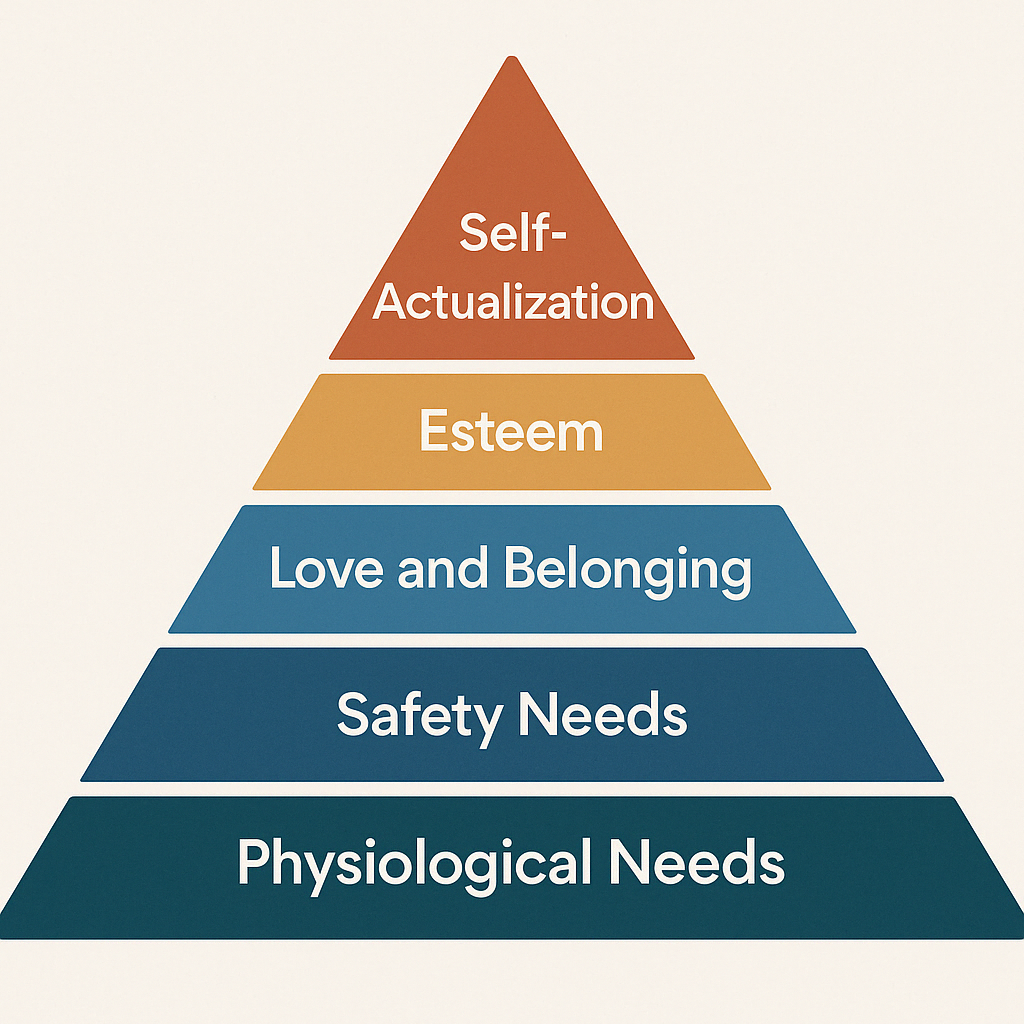
I remember first learning about Maslow’s Hierarchy of Needs in Psychology 101 at my community college. Back then, it didn’t strike me as anything revolutionary. The idea seemed simple enough: if you’re struggling to find food, water, or shelter, you’re probably not spending much energy trying to make deep connections, grow your leadership skills, or chase your dreams.
It felt like common sense.
But recently, this old pyramid has taken on new meaning for me. And I think it’s because I’ve begun to truly live it. Not in some dramatic, end-of-the-world scenario, but in the subtle, day-to-day tug-of-war between being a father, business owner, financial provider, etc. Turns out, the real brilliance of Maslow isn’t just in what it says, it’s in how deeply it maps to what we feel.
A Quick Refresher
Maslow's hierarchy is a five-level model of human needs, often depicted as a pyramid. From bottom to top, the levels are:
- Physiological Needs (food, water, shelter, sleep)
- Safety Needs (personal security, financial security, health)
- Love and Belonging (relationships, connection, community)
- Esteem (self-respect, status, achievement)
- Self-Actualization (growth, purpose, realizing one’s potential)
The basic idea is that we can’t effectively focus on higher levels until the more foundational ones are met.
That’s where it clicked for me.
It’s Not Just Actual Threats. It’s Perceived Ones.
For years, I thought the hierarchy was mostly about life-and-death issues. Like surviving in the wild or being the last person in a post-apocalyptic bunker with one can of beans. But the older I get, and the more responsibilities I carry, the more I realize that our everyday stressors are often psychological equivalents of being in survival mode.
- Financial instability? That’s a threat to safety.
- A strained relationship? That’s a threat to belonging.
- A health scare? That’s a threat to both physiological and emotional security.
- Losing a job or questioning your identity? That’s a hit to esteem and safety.
These aren’t abstract threats, they’re the kind that can make it nearly impossible to show up fully for the people and priorities we care most about.
Why You Might Struggle to Be Present
When I feel uncertain about our finances, unsure of what’s coming next, I just don’t feel the energy to walk through the front door after work, get down on my knees, and wrestle around with my four-year-old like everything’s great.
When I'm preoccupied with health concerns, or overwhelmed by some unknown future, it takes up all the mental bandwidth. And in those moments, trying to sit down and work on a self-development course feels impossible. Not because I don’t want to grow, but because I’m still trying to find solid ground.
Maslow was right: when we feel threatened (Physically or psychologically), we get pulled back into survival. Our energy, our creativity, our ability to love well… all of it takes a backseat.
What This Means for Us (and for How We Lead)
This isn’t just a personal insight, it’s a powerful lens for understanding others.
That team member who’s disengaged or irritable? They might not lack motivation. They might just be in survival mode.
That friend who never follows through on their goals? They might not be lazy, they might be stuck at the bottom of the pyramid, silently battling stress, insecurity, or isolation.
And that goes for us too.
If we want to lead, parent, support, or coach others effectively, we have to tune in to where they (And we) are in the hierarchy. Because growth doesn’t happen in a vacuum. It happens when we feel safe. Seen. Supported.
Moving Up the Pyramid, One Step at a Time
Maslow’s hierarchy isn’t a checklist. It’s a cycle. We can move up and down it several times a day depending on what we’re facing. And that’s okay.
But here’s what I’ve learned: understanding where I am in the pyramid helps me show myself (and others) more grace. It’s a reminder that there are fewer bad people in this world than there are people in distress.
Sometimes the most powerful growth moment isn’t found in a big breakthrough, but in giving yourself permission to say:
“No wonder I’m struggling to dream bigger. I’m just trying to feel secure today.”